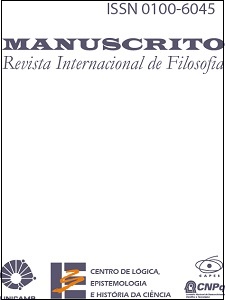Resumo
En este trabajo presento dos líneas de argumentación que desembocan en la tesis eliminativista, una proveniente de consideraciones relativas a la relación entre nuestra psicología de sentido común y la ciencia psicológica/neurociencia madura, y otra proveniente de consideraciones metafísicas acerca de la naturaleza de los fenómenos mentales y su interacción causal con el mundo físico, y trato de mostrar la inadecuación de ambas líneas argumentativas. En segundo lugar, menciono tres líneas de crítica a los intentos eliminativistas, mostrando sus debilidades. Finalmente, ofrezco una línea argumentativa alternativa para sostener la implausibilidad del eliminativismo basada en consideraciones acerca de los alcances de un posible cambio conceptual radical en nuestros conceptos mentalistas ordinarios que el eliminativismo parece suponer.
Referências
CHALMERS, D. The Conscious Mind. Oxford: Oxford University Press, 1996.
CHURCHLAND, P. “Eliminative Materialism and the Propositional Attitudes”. Repr. in P. Churchland (1989), pp. 1-22.
CHURCHLAND, P. (ed.). A Neurocomputational Perspective. Cambridge, Mass.: The MIT Press, 1989.
FEYERABEND, P. “Materialism and the Mind-Body Problem”. Review of Metaphysics, 17, pp. 49-66, 1963.
GOPINK, A., MELTZOFF, A. Words, Thoughts and Theories. Cambridge, Mass.: The MIT Press, 1997.
GRIFFITHS, P. What Emotions Really Are. Chicago: Chicago University Press, 1997.
HILL, C. Sensations. A defense of type materialism. Cambridge: Cambridge University Press, 1991.
RAMSEY, F. “Eliminative Materialism”. Stanford Encyclopedia of Philosophy, 2003. http://plato.stanford.edu/entries/materialism-eliminative/
REY, G. Contemporary Philosophy of Mind. Oxford: Blackwell, 1997.
ROCKWELL, T. Dictionary of Philosophy of Mind. Stanford, 2004. http://philosophy.uwaterloo.ca/MindDict/eliminativism.html
RORTY, R. Philosophy and the Mirror of Nature. New Jersey: Princeton University Press, 1979.
RORTY, R. “Mind-Body Identity, Privacy and Categories”. Review of Metaphysics, 19, p. 24-54, 1965.
SABATÉS, M. “Being Without Doing”. Topoi, 22(2), pp. 111-125, 2003.
RORTY, R. “Mind in a Physical World?”. PPR, 65, pp. 663-670, 2002.
RORTY, R. “The Explanatory Relevance of Psychological Properties”. In:K. Korta, J.M. Larrazabal (eds.). Truth, Rationality, Cognition and Music. Dordrecht: Kluwer, pp. 109-132, 2004.
SELLARS, W. “Empiricism and the Philosophy of Mind”. In: H. Feigl, M. Scriven (eds.). Minnesota Studies in the Philosophy of Science, Volume I: The Foundations of Science and the Concepts of Psychology and Psychoanalysis. University of Minnesota Press, pp. 253-329, 1956.
STICH S. Deconstructing the Mind. Oxford: Oxford University Press, 1996.
STICH S. From Folk Psychology to Cognitive Science. Cambridge, Mass.: The MIT Press, 1983.
KIM, J. “El mito del materialismo no reduccionista”. Análisis Filosófico, XV(1-2), pp. 35-56, 1995.
KIM, J. Mind in a Physical World. Cambridge, Mass.: The MIT Press, 1998.
KORTA, K., LARRAZABAL, J.M. (eds.). Truth, Rationality, Cognition and Music. Dordrecht: Kluwer, 2004.
LOCKIE, R. “Transcendental Arguments Against Eliminativism”. British Journal of the Philosophy of Science, 54, pp. 569-589, 2003.
LYCAN, W. “A Particularly Compelling Refutation of Eliminative Materialism” (draft).
McGINN, C. “The Hidden Structure of Consciousness”. In: C. McGinn (ed.). The Problem of Consciousness. Oxford: Blackwell, pp. 89-125, 1991.
McGINN, C. (ed.). The Problem of Consciousness. Oxford: Blackwell, 1991.
NAGEL, T. The View from Nowhere. Oxford: Oxford University Press, 1986.
PÉREZ, D. “Mental Concepts as Natural Kind Concepts”. In: New Essays in Philosophy of Language and Mind, Canadian Journal of Philosophy (supplemental volume 30). Edited by R. Stainton, C. Viger, M. Ezcurdia. University of Calgary Press, pp. 197-221, 2005.

